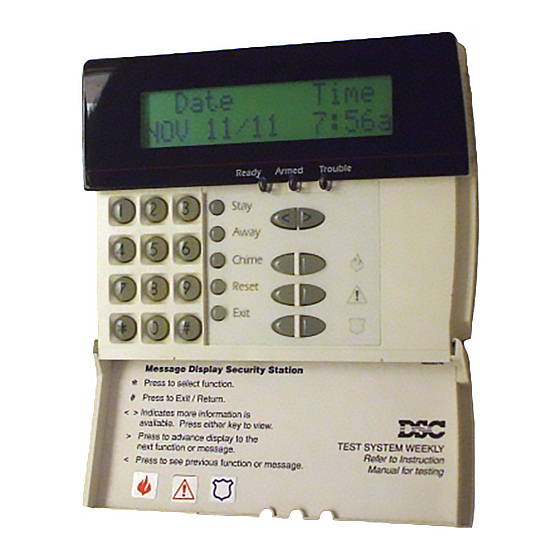DSC PC5010 - REV2 Manual de instrucciones
Navegue en línea o descargue pdf Manual de instrucciones para Sistema de seguridad DSC PC5010 - REV2. DSC PC5010 - REV2 18 páginas.

About Your Security System
Your DSC Power832 Security System has been designed to provide you with the greatest possible
flexibility and convenience. Read this manual carefully and have your installer instruct you on your
system's operation and on which features have been implemented in your system. All users of this
system should be equally instructed in its use. Fill out the "System Information" page with all of you
zone information and access codes and store this manual in a safe place for future reference.
Fire Detection
This equipment is capable of monitoring fire detection devices such as smoke detectors and providing
a warning if a fire condition is detected. Good fire detection depends on having adequate number of
detectors placed in appropriate locations. This equipment should be installed in accordance with
NFPA 72 (N.F.P.A., Batterymarch Park, Quincey MA 02269). Carefully review the Family Escape
Planning guidelines in this manual.
NOTE: Your installer must enable the fire detection portion of this equipment before it becomes
functional.
Testing
To insure that your system continues to function as intended, you must test your system weekly.
Please refer to "Testing Your System" on page 13 of this manual. If your system does not function
properly, call your installing company for service.
Monitoring
This system is capable of transmitting alarms, troubles and emergency information over telephone
lines to a central station. If you inadvertently initiate an alarm, immediately call the central station to
prevent an unnecessary response.
NOTE: The monitoring function must be enabled by the installer before it becomes functional.
General System Operation
Your security system is made up of a DSC Power832 control panel, one or more Power832 keypads
and various sensors and detectors. The control panel will be mounted out of the way in a utility closet
or in a basement. The metal cabinet contains the system electronics, fuses and stand-by battery.
There is normally no reason for anyone but the installer or service professional to have access to the
control panel.
All the keypads have an audible indicator and command entry keys. The LED keypads have a group
of zone and system status lights. The LCD keypad has an alphanumeric liquid crystal display (LCD).
The keypad is used to send commands to the system and to display the current system status. The
keypad(s) will be mounted in a convenient location inside the protected premises close to the entry/
exit door(s).
The security system has several zones of area protection and each of these zones will be connected
to one or more sensors (motion detectors, glassbreak detectors, door contacts, etc.). A sensor in
alarm will be indicated by the corresponding zone lights flashing on a LED keypad or by written
messages on the LCD keypad.
A security system cannot prevent emergencies. It is only intended to alert you and – if included –
your central station of an emergency situation. Security systems are generally very reliable but
they may not work under all conditions and they are not a substitute for prudent security practices
or life and property insurance. Your security system should be installed and serviced by qualified
security professionals who should instruct you on the level of protection that has been provided
and on system operations.
IMPORTANT NOTICE
1
